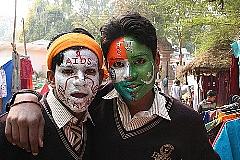MPs urged to spread awareness of HIV/Aids
From Darhoon Menghwar, of the Daily Ibrat, a Sindhi newspaper in Hyderabad, Sindh province, Pakistan, who attended a Thomson Reuters Foundation "Reporting HIV/AIDS" course in Bangkok in 2008.

HIV/Aids cases in Pakistan have climbed above 80,000 and a further rapid rise is likely unless swift action is taken, the government has warned.
Speaking in the national assembly, Mahreen Bhutto, parliamentary secretary for health, said the HIV/Aids control programme had not worked well over the past six years and its reputation was poor. But the government was working hard to spread awareness of the disease and the need for preventative measures.
HIV is spreading fast in South Asia, mostly through injecting drug users. Heroin and other drugs are easily available in the markets of Pakistan, smuggled in from neighbouring Afghanistan.
According to the Aids Control Authority in Sindh province, 60 to 70 per cent of HIV infection in Pakistan is spread through intravenous drug use, 20 per cent through male-to-male sexual contact, 6 per cent male-female contact and 0.1 per cent mother-to-child. Four per cent is due to other causes. Truck drivers and other workers help carry HIV from urban to rural areas. In the cities, the so-called “third gender” - hijras, or lady-boys - are another big factor.
The health minister said members of parliament had a duty to spread awareness of HIV/Aids as they are not only leaders but often heroes in their home areas. “We will encourage their struggle,” she said. “They should address these issues in public. MPs can play a key role in educating the population.”
But the task of educating the people is not easy. Emerging from more than 30 years of dictatorship, Pakistan is still beset by corruption and inefficient institutions. Democracy is bringing change, but slowly.
The education system is still weak. Government sector education suffers from political interference. Fewer than 40 per cent of women are being educated, 50 per cent of men. In rural areas more than 80 per cent of women are uneducated and do not know about their rights – they may not even be allowed to leave their home. A backward, feudalistic society shuns education, so most farmers’ children are illiterate.
In Pakistan 30,000 women die every year during or after pregnancy - one every 17 minutes. In rural areas pregnant women are not allowed to go to hospital for delivery; unskilled village “Daies'' do deliveries. So mortality rates are high. Few rural areas have women doctors, according to health worker Lachhami Bhatia, of the NGO “Hope”. She works in rural areas near Hyderabad. “In this complicated situation, how can you expect to spread awareness about HIV/Aids?” she asks. “People are not ready to accept that HIV is dangerous; mostly Pakistanis regard HIV as a disease of Europe.”
Pakistan has yet to conquer an earlier scourge, polio. Poor management is blamed. The latest anti-polio campaign was launched before 2000 but rates are rising despite the vaccination programme. Pakistan signed up to a Millennium Goal of becoming polio-free by 2015 but this target now looks unlikely.
END
DARHOON MENGHWAR

